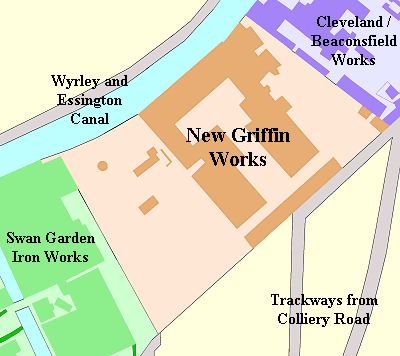 |
New Griffin Works appear to
have been built sometime between 1842 and 1881. The
factory is not marked on the 1842 Tithe map, but can
be seen clearly on the 1881 Ordnance Survey map.
In the latter part of the 19th
century the buildings were occupied by edge tool
maker William Edwards & Son. The business is listed
in Pigot & Company’s 1842 Directory, and White’s
1851 Staffordshire Directory as being located in
Dudley Road. They also owned Griffin Works in
Horseley Fields, before moving to New Griffin Works. |
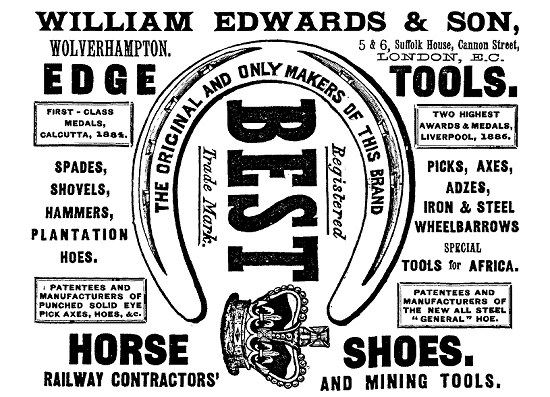
An advert from 1891.
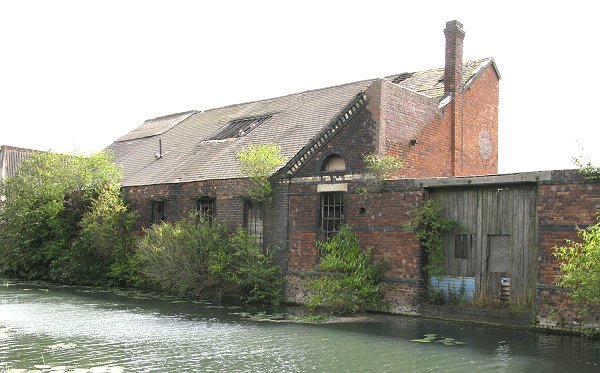
What remains of New Griffin Works canal
wharf. As seen from the Wyrley and Essington Canal.
| The next section is part of an article that
appeared in the Wolverhampton and South
Staffordshire Illustrated. Unfortunately the date is
not known. |
|
In the construction of the New
Griffin Works, many features of improvement in
design and arrangement would be suggested by the
long practical experience of the proprietors, and in
our progress through several departments, frequent
evidences of this progressive adaptation of modern
appliances and methods came under our notice.
The new works occupy a most
convenient site in Willenhall Road, covering upwards
of four acres, bounded by the Birmingham Canal on
one side, and close to the Wolverhampton and Walsall
section of the Midland Railway Company. The premises
comprise, in the front portion, handsomely appointed
general and private offices, adjacent to which are
store rooms and the entrance to the large open
quadrangle, round which are ranged the various
substantial buildings devoted to the manufacturing
departments.
On the right and left of the
entrance are four large forging shops, each fitted
with a number of smith’s hearths furnished with
steam blowing apparatus on an entirely new
principle, one portion of the forges being utilised
for the manufacture of horse shoes. The firm are the
original and only makers of the ‘Best Crown’ brand,
a speciality largely supplied to her majesty’s
government. Other brands as shown by the
accompanying Trade Marks are widely known and
esteemed in the home and foreign markets. Spades and
shovels are also one of the special features at
these works.

Trade Marks
At the further end of the yard
are the forging shops in which heavier steam hammers
are placed, some weighing nearly four tons. To bear
this immense weight and consequent concussion, the
floor of these shops has been specially prepared
upon a foundation of some eight or ten feet of
massive logs of timber, concreted on the top.
The engines used in driving the
machinery are of exceptional size and power, and are
fitted with immense flywheels, one of the engines
being served by three enormous boilers, each of 37
feet long.
At the entrance end of the
premises are the grinding and polishing shops,
similar in arrangement to those already described in
the old works (Griffin Works, Horseley Fields). At
both establishments extensive space is allotted to
the warehousing and packing of the firm’s finished
goods, to which our attention is next directed.
Literally speaking Messrs.
Edwards and Son’s manufactures can claim world-wide
utility and favouritism in their many sided
application to the arts of cultivation. Railway and
road-making, and mining and woodcraft operations,
for which they are exclusively designed. Without
entering upon a fully detailed description of the
numerous range of articles of their production, we
may present particulars of the more representative
types of edge tools, which offer special features of
interest to the trade. In implements of cultivation
there are, perhaps most widely known as the
inventors and makers of the ‘Royal Express’ hoe,
which has almost entirely superseded the old
‘Brazil’ iron hoe, with its shoulders more than half
an inch thick, and its blade 11 inches wide.
The firm also make an improved
type of wrought-iron wheel barrow, with steel bodies
constructed in parts, which are put-up in handy form
for packing for the export markets, that they may be
easily put together again when landed at their
destination.
Messrs. Edwards & Son have long
since met with justly merited recognition at some of
the principal industrial exhibitions of the century,
their record including the award of a first class
certificate and silver medal for their edge tools,
spades, shovels, hoes, and horse shoes at Calcutta,
1883-84. Two first class certificates and highest
awards at Liverpool International Exhibition, 1886,
while their handsome and attractive stand at the
more recent Wolverhampton Fine Arts and Industrial
Exhibition obtained the highest award in its own
particular section. |
|
In 1913 New Griffin Works were
purchased by the Vulcan Manufacturing Company, owned
and run by the Waine family. Joseph Waine & Co. Ltd, general
lock, latch & bolt makers, and brass and iron
founders was located at Imperial Works, Wood Street,
Willenhall. Joseph had three sons, John Vincent
Waine, G. A. Waine and Horace T. Waine.
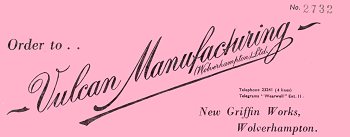
John Vincent Waine, and his
brother G. A. Waine, started the Vulcan
Manufacturing Company at Blackheath, Birmingham, in
about 1910. The company manufactured Heel Tips, Toe
Plates and had the most up to date machinery in the
world. The factory turned out 288,000 pairs of heels
per week, under their Vulcan brand name. The
company specialised in a number of products
including No. 0 and 1 York heels, 21B heels, mule &
horse shoes for the Indian, Turkish, African and
South American markets, and japanned and galvanised
door bolts. A large number of other products were
produced including the following:
Brass -
chromium-plated or with
special finishes, stainless steel, garage bolts,
cabinet bolts, japanned or galvanised door bolts, shelf brackets, aluminium door and
gate latches, door stops, casement stays and fasteners, hasps
and staples, hinges, brass and steel gate and tee,
gutter brackets, swivel ties, tinned angle brackets,
rim, dead and mortice locks, latches, padlocks,
stamped brassware, and household soldering sets.
The works covered over an acre.
Extensive trade was done with the War Office, the
Army and in various parts of Europe. Horace T. Waine
was also involved in the business, and due to his
international travels the products were also sold in
Japan, Burma and Egypt. The company also had an
establishment in the Potteries.
In 1913 the Directors decided
to move the three factories to one site to improve
the company's efficiency. In June New Griffin Works
in Colliery Road, Wolverhampton was purchased, and
the three factories were combined under one roof. At
the time New Griffin Works was empty. The factory
backed onto the Wyrley and Essington canal so that
narrow boats could be loaded and unloaded. |
|
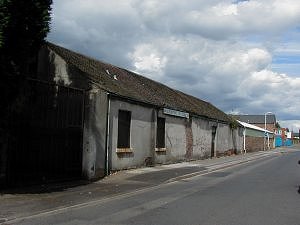
New Griffin Works seen from
Colliery Road. |
In 1928, Theo Waine and his
brother Mr. G. A.Waine, took over the Wearwell Cycle
Company Limited from the liquidators of the Wulfruna
Engineering Company Limited.
Their sons, H. V. Waine and T.
A. Waine were issued with one ordinary share each,
and appointed as directors at the first shareholders
meeting, which took place at the New Griffin Works.
The new company was registered as the Wearwell Cycle
Company (1928) Limited. |
| Initial finance was provided by
the issue of £4,000 worth of £100, 7% debentures
which were the responsibility of H. V. Waine, who
had also been appointed company secretary. At a
second meeting shortly afterwards it was resolved to
purchase from the Vulcan Manufacturing Company
(Wolverhampton) Limited, the plant, tools and
stock-in-trade of the cycle manufacturing side of
their business, for £10,209.16s.5d. |
| A view of the southern end
of the works taken in 2001. |
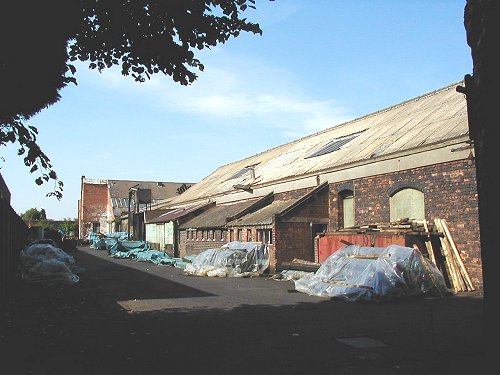 |
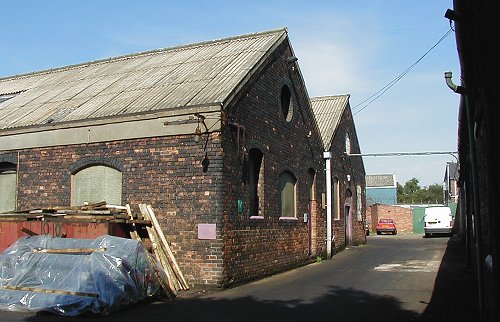 |
The eastern end of the
buildings in the previous photograph, also from
2001. |
| The back of the building
that fronts onto the canal.
From a photograph taken in
2001.
|
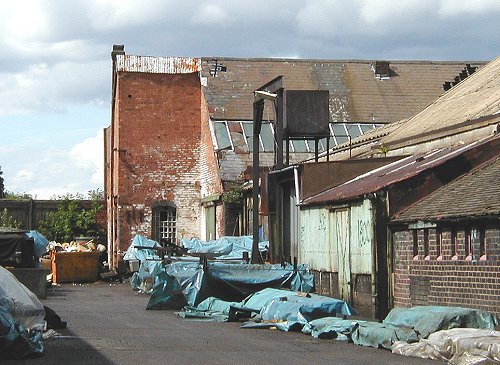 |
|
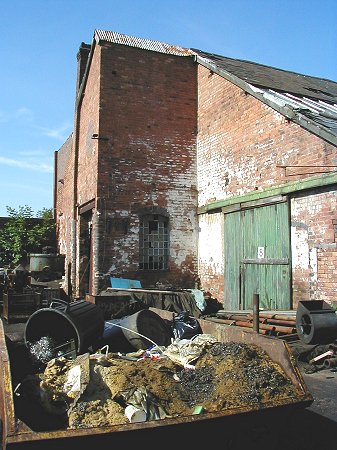
A close-up of the rear
building. Also from 2001. |
A full range of cycles were on
offer in 1929 including tradesmen's cycles,
juveniles, scooters, and sports machines.
The Vulcan
Manufacturing Company (Wolverhampton) Limited applied for
6,000 ordinary shares of £l each to be issued for
cash, and in 1931 the factory was expanded to
include the production of 'Wolf' motorcycles.
The company prospered and sales
continued to increase.
The works were badly damaged
by fire in March 1932 when fire fighters battled for
eight hours to control the fire, which caused
£10,000 worth of damage. |
| Mr. H. V. Waine, a keen
motorcyclist, was responsible for the design and
production of both motor cycles and cycles, while
Mr. T. A. Waine was responsible for sales. In July
1932, Mr. G. A.Waine, and Mr. J. V. Waine of the
Vulcan Manufacturing Company, were each issued with one
share each, and appointed advisors to the company.
|
| |
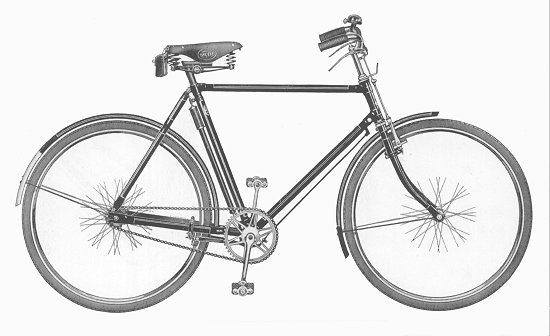
A Wearwell Gents Popular
bicycle. |
|
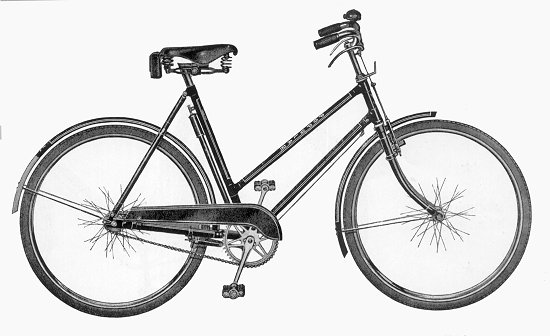
A Wearwell Ladies Popular
bicycle. |
|
| |
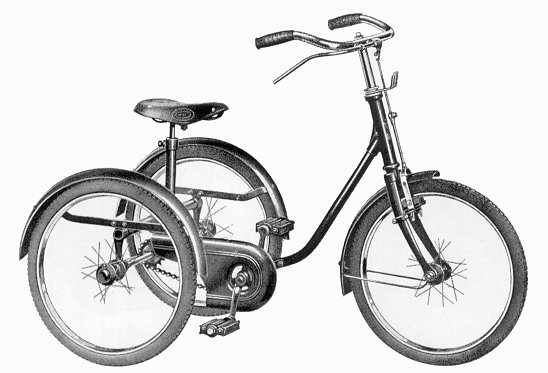
A childrens tricycle. |
|
Waine Eastern Agencies of
Singapore, were appointed sole selling agents for
India, Ceylon, Burma, Straits Settlements, Siam and
China. Other agents elsewhere were subsequently
appointed. A considerable number of cycles were
exported to India, and post war Wearwell (India)
Ltd, a wholly Indian owned company, manufactured
cycles with technical support from the Wolverhampton
company, which had reverted to the title of the
Wearwell Cycle Company Limited in 1933. Motor cycle
production finally ended during the war.
|
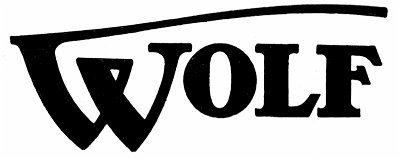
|
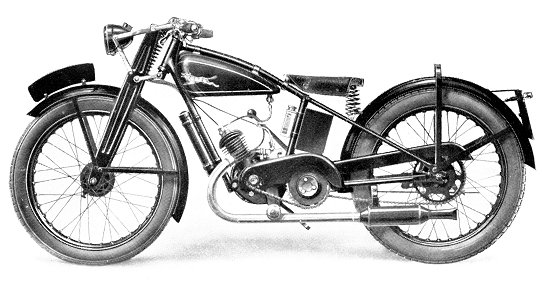
A Wolf 'Cub' from 1932. |
|
| |
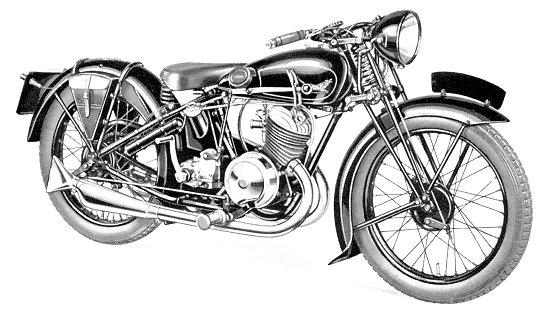
A Wolf 'Super Sports' from
1937. |
|
H. V. Waine, who was an air
raid warden during the war, remarked one night
during the blitz that there was quite a blaze on the
horizon, only to discover it was his own factory!
The workers set-to the following day and soon had
some production restored. The factory buildings were
quickly rebuilt, though fire damaged machinery was
not all cleared away until after the end of the war.
After the war the cycle side of
the business continued to be successful with 75% of
sales going abroad, and the company cycle team won
the Tour of Britain cycle race in 1953. By this time
the company employed several hundred workers, and
also developed a toy department making children’s
tricycles, swings and other items.
Unfortunately sales declined in
the late 1960s. As a result the Vulcan
Manufacturing company went into voluntary
liquidation in 1969, and the goodwill was sold to Tippers,
who were in the same line of business.
Today (2020), New Griffin Works are
derelict. The factory was occupied by hydraulic equipment manufacturer Hydrafit,
but its future is now uncertain. The part of the factory where the bicycles
and motorcycles were built has gone.
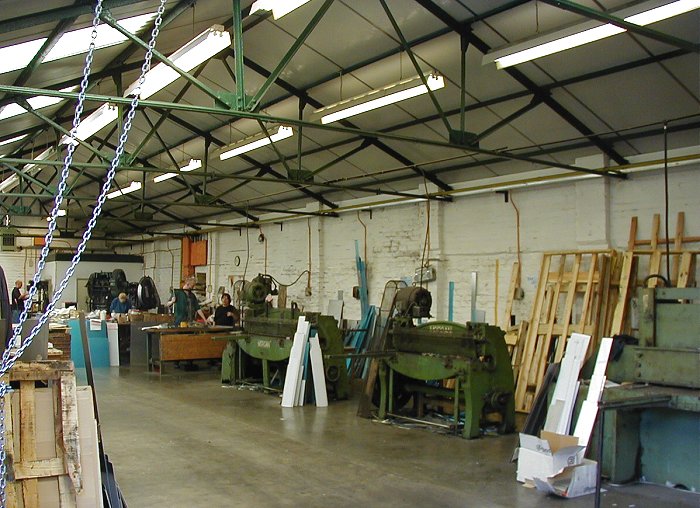
The factory in 2001 when it
was occupied by Hydrafit. |
 |
Return to the Canals
and Industry Menu |
|